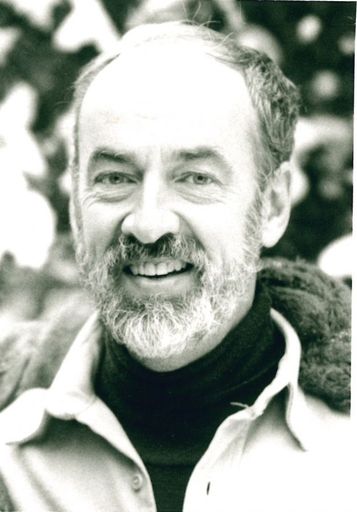

1937
John
2018
John Charles Carlson
March 11, 1937 — May 11, 2018
MADISON-On a sunny summer afternoon at our cabin on Fence Lake, John Charles Carlson ("Jack") paused momentarily from reading Madame Bovary by Gustave Flaubert to quote a passage to his son that he deemed particularly eloquent: "Human speech is like a cracked kettle on which we tap crude rhythms for bears to dance to, while we long to make music that will melt the stars."
And so it is with this obituary. We, his family, long to make music that will pay homage to his life and to what it meant to those it touched. But the typical obituary - a sort of résumé of the deceased - can only be but a crude tapping on a cracked kettle. Sorry, dad, but if there's one thing that gives us comfort, it's the certainty that if you were here to read this, you'd be grateful for the effort that went into it and oblivious to the crude rhythms that compose it.
Jack was born to Al and Ruth Carlson on March 11, 1937, in Kenosha, Wisconsin. He had a sister, Joan, who died at a tender age and two brothers, Duane and Jim, now deceased. Jack died on May 11, 2018, in the comfort of his own home, after battling Parkinson's Disease for over a quarter century. His family members were present during his final days and are grateful for the wonderful assistance provided by Agrace Hospice and other caregivers.
Jack grew up in both Racine and Kenosha in a family of modest means. He was a frequent participant in pickup baseball games at Penoyer Park. He graduated from Bradford High School in 1955 and earned a B.S. degree from the University of Wisconsin, Madison in 1959. During the summer after his graduation, he married his high-school sweetheart, Sandy Nelsen, and in the fall of that year, he began his studies at the University of Wisconsin Law School. He so excelled in his legal studies that he made law review and was elected to the prestigious Order of the Coif when he graduated in 1962. Following graduation, Jack began his law practice at the law firm of Lawton & Cates, where he practiced for four decades. He was a consummate lawyer - the rare, well-rounded advocate who could win over a jury's minds and hearts, write an insightful and persuasive brief, and effectively argue his client's position on challenging legal issues. His professional ethic mirrored the same conviction he exemplified in his family and personal life - an empathetic commitment to serving the needs of others. He continued his practice until Parkinson's Disease necessitated retirement. His immediate surviving family members are his wife of 58 years, Sandy, and his three children, Kären, John, and Kristin.
Before becoming afflicted with Parkinson's Disease, dad was vigorously healthy. He was running well before the début of the first Nike waffle trainers. He was a strong bicyclist, an avid tennis player, and a good golfer, though golf tended to elicit the occasional expletive. He actively shared in his kids' sporting activities, including Karen's gymnastics and tennis, Kristin's soccer and track, and John's hockey and soccer. He enjoyed playing tennis with his wife, except when she'd win. He completed both a marathon and the Birkebeiner cross country ski race. He was one gnarly dude! Even as Parkinson's Disease progressively sought to rob dad of his physical and mental health, he maintained a quiet dignity, never succumbing to the bitterness or desperation that one might expect would attend such a disease, and always showing love and concern for his family above all else, even in his final days.
But we'd prefer that our parting words not focus on dad's final days. Instead, let us drift back in time to recapture some of his own thoughts when he was still vibrant and vigorous - thoughts that will forever transcend his departure. The date is February 5, 1983, one of the Sundays when dad would write to his kids in college. And he didn't use a word processor; he penned these letters in a handsome cursive. This particular one was addressed to his son, a college freshman anxious about his wherewithal to succeed academically. Dad described in the letter a PBS TV special about species whose behavior suggested a prioritization of propagating the gene pool of the species at large, rather than individual members of the species fighting for their own survival. One such example was salmon, among whom even non-fertile "adolescents" would make the voyage upstream to spawn. Blending science and poetry in dad's typical fashion, he also quoted George Vukelich, who wrote of salmon who journey thousands of miles upstream, back to their birthplace where they finally die:
The proper study is the salmon fish.
The great hearts from the far Pacific,
Fighting upstream in the thousand-mile rivers.
The blue silver schools, strong as bombs,
Returning to the freshwater where they were born,
To spawn and start a new generation.
Then the settling in the shallows of sand for death.
The life-drive gone, I do not know if they have concern:
Life and Death and the Final Worth,
There is a cycle working.
It goes on working without any words.
A sailor should study this salmon fish.
It is true after many voyages there is finally the return to the very first port.
You have forgotten; in a flash I remember.
You must go and find for yourself, ANSWERS.
And the great gulls going like nails into the living eyes of the faithful.
After quoting this passage, dad wrote:
Answers; sure, you must go and find them for yourself, but where do you look? There is truth but there is also meaning. The truth is what the salmon do. The truth
is that it is magnificent behavior. But what is its meaning? Is it worth such a gigantic effort just to pass along a few genes to a new shell? Why? You must go and
find for yourself, ANSWERS.
Maybe it's just to live - to sense, experience, share, relate, love. You swim upstream because it's worth passing it on.
It doesn't' matter what grade you got. You shared thoughts with some of the best thinkers. ANSWERS, keep looking.
Love,
Dad
One of dad's Answers was to help those struggling to swim upstream and to prioritize the wellbeing of those he loved over his own interests, even at his own expense. For that we are, and forever will be, grateful, and as much as we miss dad, we are thankful he is at peace.
To those who knew my father, you can pay your respects by hugging a loved one, helping someone in need, or committing a random act of kindness. If you wish to make a charitable contribution, please donate to Agrace Hospice or to the charity of your choice.
Peace Dad.... We love you....
To order memorial trees in memory of John Charles Carlson, please visit our tree store.
Guestbook
Visits: 12
This site is protected by reCAPTCHA and the
Google Privacy Policy and Terms of Service apply.
Service map data © OpenStreetMap contributors


